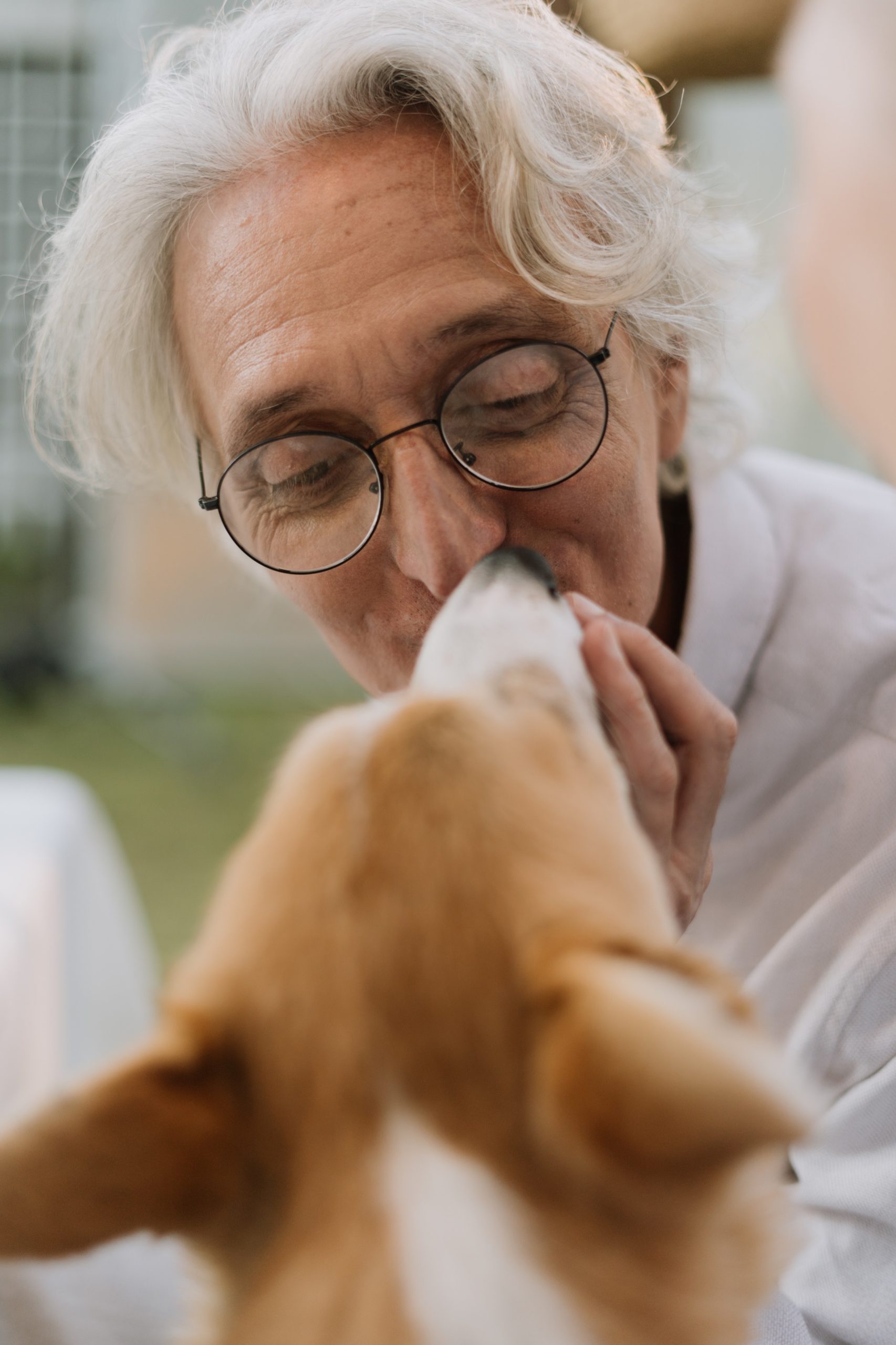The Pros, Cons & Possibilities of Pet Ownership for Aging Adults
a collaboration with guest author, Eva Yang
The Benefits of Pets for Seniors
Human-animal interaction (HAI) has been associated with better health in older adults. Older pet owners tend to have lower blood pressure, lower heart rate, and quicker recovery during mental stress.
Pet ownership provides older adults companionship, which often decreases the negative emotions associated with loneliness. Companionship through pet ownership has shown to improve the meaning and purpose of life. Animals have been associated with stress reduction that benefits older adults as they move through life transitions.
In addition to emotional benefits, pet ownership frequently brings physical benefits too. Dog owners are more physically active; in fact, dog owners on average walk more frequently than those without dogs ( Nancy R. Gee, Megan K. Mueller, and Angela L. Curl). A regular physical activity routine contributes to pet owners having a tendency to be healthier, stronger, and with a positive outlook. A study of The Utilization of Robotic Pets in Dementia Care concluded that pets decreased stress and anxiety in elderly clients with dementia. (Sandra Petersen et al. J Alzheimers Dis. 2017)

The Hazards of Pets for Seniors
While there are numerous benefits to pet ownership, there are many hazards too. Older adults may have a higher risk for falls and associated injuries due to low vision, balance challenges, mobility difficulties and more. The daily routines of pet ownership frequently require bending, lifting and reaching. Feeding, watering and cleaning up after pets are regular tasks that may be challenging for an aging adult. These movements can easily disturb an older adult’s balance and contribute to fall risk. Other risks include a pet moving underfoot which can cause an older adult to quickly maneuver to avoid them. The pet’s belongings, such as toys and bowls can increase clutter and trip hazards on the floor. Water bowls present a spill hazard, which can be difficult for aging adults to frequently bend to clean up. Other hazards could be falling while walking a pet or becoming entangled in a pet’s leash. If a pet is too welcoming and jumps toward an aging adult, it can result in injuries including falls or skin tears.
The costs of pet ownership may be restrictive for some older adults. Pets require basic expenses of food, water, preventative medications and maintenance. Like people, pets also are prone to becoming sick and requiring additional medical care too. These expenses should all be taken into consideration prior to getting a pet.
An additional concern about pet ownership is if an older person has to move into a senior living community or passes away. Planning ahead for these scenarios is essential for older pet owners.
Planning Ahead for Unexpected Events
It is important and recommended to plan ahead to make sure that a pet will continue receiving care and love if a medical emergency or other concern would arise. Besides family and friends, some animal programs and charities may be willing to care for pets while the owner is unable to care for their pet while hospitalized or in skilled rehab. A boarding facility may also be a feasible short term option for pet owners not able to provide care for a pet.
To plan for the future, a special will can detail who will provide pet care and ownership as well as the money necessary to care for a pet. If a pet’s owner passes away unexpectedly or moves into a senior living community, a family may choose to re-home the pet. There are multiple considerations to keep in mind when rehoming a pet.
- If rehoming privately, be sure to do research. Consider asking for vet references and completing a home visit. This can help ensure the pet is going to a good home as well as reduce the risk of the pet becoming a victim of abuse or neglect.
- Consider surrendering to an animal rescue.
- Non-profit, no-kill shelters can assist a pet in finding a new home without the risk for euthanasia.
- A foster-based rescue relies on foster families to care for pets while they await adoption. This process can be helpful in easing the transition for a pet.
- If the pet was originally adopted from a shelter, contact them first. Many adoption contracts require the pet to be returned to the original rescue.
- If the pet is a purebred or designer breed, research breed-specific rescues. These rescues frequently have a waiting list of families waiting to adopt an animal of a specific breed.

Alternatives for Pet Ownership for Seniors
We’ve reviewed the many hazards of pet ownership as well as the benefits. Fortunately, there are many ways to reap the benefits of pet ownership without being a pet’s primary caretaker. Local animal shelters often are in need of foster families, who provide temporary care to pets awaiting adoption. This is a short term commitment with long term benefits. Other volunteer opportunities are often available at local rescues and shelters including assisting with events and opportunities like “dog’s day out.” According to ASPCA, dog walking is the most needed help, which calms the dog down when transitioned to a kennel. Meanwhile, walking dogs is a good exercise for older adults to maintain physical activity and mobility. If you have experience in training service or therapeutic pet, you can continue doing so as an alternative way of pet ownership. Additionally, rescues frequently need assistance with transporting pets, which can be a great way to get out of the house and love on a pet in the process.
Older adults may qualify for a visit from a therapy animal program. Therapy animals are not service animals, but are trained to visit hospitals, senior living communities and more. These programs coordinate therapy animals and handlers to provide therapeutic and educational services. In Iowa, the ARL hosts “TheraPets,” and visits can be requested on their website.
Another alternative for computer savvy older adults online pet ownership games such as Pokemongo. Many animal sanctuaries and zoos provide the opportunity to watch their animals on the web. The San Diego Zoo offers live cams of over 13 animals! These programs help connect older adults digitally with animals and provide emotional companionship without any cost or labor.
Robotic pets are another option for older adults, particularly older adults with dementia or other cognitive changes. There are a wide range of robotic pets to fit any budget, from manufacturers such as FurReal Friends to age-specific brands like Joy for All Companion Pets. Evidence supports the use of robotic pets to decrease stress and anxiety in older adults with dementia.
Lastly, you can also sponsor and adopt pets remotely by contributing to the cost of raising them, and in return, you will receive cards and pictures of your pets regularly. These opportunities are frequently available for wildlife sanctuaries, like the Adopt a Manatee Program.

Adaptive Equipment for Pet Owners
Older pet owners should place equipment that is used for pet care strategically to ensure safety and comfort. Installing big grips on the tools such as animal brushes, scoop, etc. will help older adults to hold it more comfortably to care for the pet. Other assistive devices such as long handle scoop, waste catcher, rake, and the bin will increase ease of use. For high tech owners, a litter robot can clean the animals’ waste for you and reminds owners when it’s time to empty the bin. Older pet owners may use a voice assistant or clock to set a reminder to walk their dogs or feed their pets. Older adults are recommended to use raised food bowls to feed their pets, which prevent them from being injured. Besides hand-feeding, older adults should also consider using an auto feeder to provide their pets with a pre-set amount of food at a pre-set time. Buying pet food or other supplies might be challenging for older adults. Older adults may find delivery services helpful, such as Chewy, Petco, and Amazon that provide a subscription service for supplies to be delivered regularly at a promoted price.
Product Links:
WOPET Automatic Pet Feeder : https://amzn.to/3or62ck
PETKIT Automatic Smart Feed Pet Feeder: https://amzn.to/2YrOIsW
Omega Paw NRA15-1 Improved Roll ‘n Clean Self Cleaning Litter Box, Regular, Pewter https://amzn.to/39sqyVB




